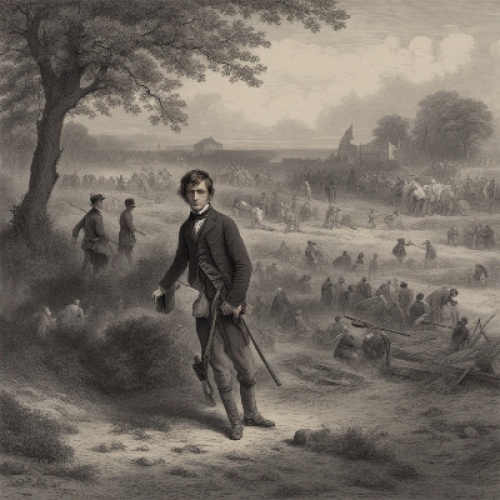Mark, the son of a blacksmith, was no stranger to the consequences of war. His family had lost
everything - his father was killed in a raid, and his mother struggled to keep their meager home together. At twenty-two, Mark was at a crossroads in life. He could join one of the warring factions or continue to survive in the shadows, watching the land he loved crumble to dust.
But something stirred within him, a yearning for peace that ran deeper than fear. He knew he could not continue to stand idle while his country tore itself apart. Mark didn't have power or wealth, but he had something far more valuable - hope.
Mark had heard whispers of a group of men and women in the far northern mountains, individuals who believed peace could be restored through negotiation rather than bloodshed. They were called the Council of Unity, though few believed they could succeed in a time when violence reigned supreme.
Despite the danger, Mark decided to seek them out. Armed with nothing but a small bag of provisions and a determination fueled by desperation, he set out on foot toward the north. The journey was perilous. He crossed battlefields where bodies lay scattered, their eyes staring blankly at the sky, and passed through villages that had been reduced to ashes. Along the way, he met people just like him - tired of the endless fighting, yearning for a glimpse of the life they had before the war.
As the days turned into weeks, Mark's resolve grew stronger. Each encounter with those affected by the war further fueled his desire to put an end to the conflict. He realized that peace wasn't just about stopping the fighting; it was about healing the wounds that had been inflicted on the land and its people.
After weeks of travel, Mark finally reached the hidden mountain sanctuary where the Council of Unity met. It was a modest camp nestled deep in the forest, surrounded by tall trees that offered both protection and isolation. As he approached, Mark was greeted by a middle-aged woman named Elara, one of the Council's leaders.
"We've been expecting you," she said, her voice calm but firm. "Word of your journey has reached us. You wish to bring peace, but you are young. What makes you think you can succeed where others have failed?"
Mark, though exhausted from his journey, stood tall. "I've seen enough death and destruction to know that fighting will not bring an end to this war. I don't have all the answers, but I'm willing to fight for peace, not with weapons, but with words and actions."
Impressed by his determination, the Council allowed Mark to stay and learn their ways. Over the next few months, he trained with the members of the Council, studying diplomacy, strategy, and the art of negotiation. Elara became his mentor, teaching him how to navigate the complex web of alliances and betrayals that had torn the country apart.
One day, while discussing the current state of the war, Mark had an idea - a risky but potentially powerful strategy that could bring the warring factions to the negotiating table.
"The leaders of the two largest factions - General Lethar and Lord Ventris - have been locked in battle for years. Both are strong and neither is willing to back down. But what if we could make them see that this war will destroy them both if it continues?"
Elara raised an eyebrow. "And how do you propose we do that?"
"We need to convince them that there is no victory to be won in this war. They're both too proud to listen to outsiders, but if we can get them to see the devastation from the perspective of their own people, perhaps they'll realize the futility of their fight."
The Council was hesitant at first, but Mark's passion convinced them. The plan was set in motion. Over the next few weeks, Mark traveled to the leaders of both factions, risking his life by walking straight into the heart of the battle. He appealed to their humanity, not their egos. He showed them letters from their soldiers and their people - pleas for the war to end, for families to be reunited, for children to grow up without the fear of death.
At first, neither General Lethar nor Lord Ventris was willing to listen. They saw Mark as a na�ve idealist, someone who didn't understand the realities of power. But slowly, as he continued to meet with their commanders and advisors, seeds of doubt began to take root.
Mark played a dangerous game, pitting each leader's fear of losing against their desire for control. He convinced them that if they continued to fight, both would be destroyed, but if they came together, they could maintain their power while also securing peace. It was a delicate balance, but one that slowly began to shift the tide.
The final turning point came when Mark arranged for both leaders to visit a village that had been completely destroyed by the war. There, they saw firsthand the consequences of their actions - the burned homes, the grieving families, and the children orphaned by their endless conflict.
Standing amidst the ruins, General Lethar and Lord Ventris finally agreed to meet under the banner of peace.
The peace negotiations took place in a neutral town, with representatives from both factions present. Mark, now widely known as a mediator, played a crucial role in guiding the discussions. He reminded both sides of the common ground they shared - their desire for stability, prosperity, and a future for their people.
It wasn't easy. There were moments when it seemed like the talks would collapse, and the war would resume. But Mark's persistence, along with the support of the Council of Unity, kept both sides at the table.
After weeks of tense negotiations, a peace accord was finally reached. Both factions agreed to lay down their arms, to rebuild what had been lost, and to govern together in a fragile but hopeful alliance.
When the peace was announced, the country rejoiced. After years of suffering, there was finally hope for a future free of war. The transition was not without its challenges - wounds that deep could not heal overnight - but the country began to rebuild, piece by piece.
As for Mark, he returned to his village, not as a soldier or a politician, but as a symbol of what one person's courage and determination could achieve. The land that had been torn apart by war slowly began to flourish once more, and Mark became known throughout the land as the man who had restored peace.
In the years that followed, Mark continued to work for the betterment of his country, always advocating for unity over division, and peace over war. And though he never sought power or glory, his legacy would endure for generations as the man who, against all odds, brought peace to a broken land.
Years later, the story of Mark's journey would be told around campfires and in the halls of the new government. His name became synonymous with peace, a reminder that even in the darkest times, one person's vision of a better world could change the course of history.
Mark's story was not just about stopping a war - it was about healing a nation, one heart at a time.
Years later, the story of Mark's journey would be told around campfires and in the halls of the new government. His name became synonymous with peace, a reminder that even in the darkest times, one person's vision of a better world could change the course of history.
Mark's story was not just about stopping a war - it was about healing a nation, one heart at a time.





